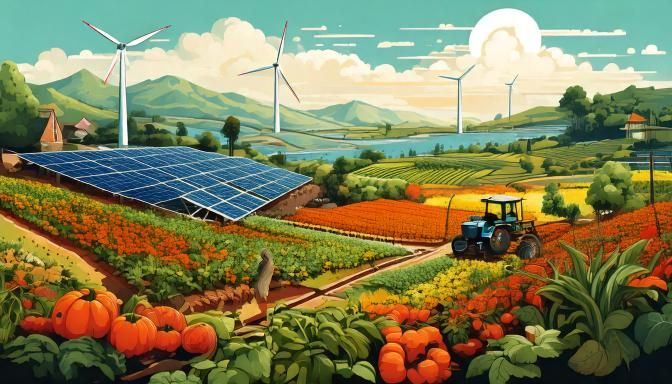Urgent Action to Reform EU Agricultural Policies to support Sustainable Agriculture

The European Commission, The Members of the European Parliament, The Ministers of Agriculture
This petition is run by [% inititator_name %]
Petition
To swiftly and effectively transform the EU food system, we urge the European Commission and European Parliament to:
1. Cap Agricultural Subsidies: Limit EU subsidies to a small number of hectares per farm, ensuring large-scale operations do not disproportionately benefit.
2. Restrict Meat & Dairy Subsidies: Cap the percentage of EU subsidies allocated to meat and dairy farming, prioritizing sustainable practices.
3. Introduce CO2 Taxation: Implement a CO2 tax on meat and dairy farming across EU member states, following Denmark's example, to internalize the environmental costs of these industries.
4. Include Meat & Dairy in CBAM: Expand the Carbon Border Adjustment Mechanism (CBAM) to include meat and dairy products or develop an equivalent policy to address the carbon footprint of imported and exported meat.
5. Develop a Land Use Plan: Establish an EU land use plan that prioritizes reforestation, afforestation, and bio-based building materials, aligning land use with climate and biodiversity goals.
6. Support Industry Transformation: Redirect subsidies to help farmers and the food industry transition to sustainable, regenerative practices that minimize environmental impact while ensuring fair income for farmers.
7. Incentivize Consumer Demand Reduction: Ban ads for meat and dairy products to limit promotion of high-emission foods, Promote plant-based diets through public campaigns and incentivize businesses that prioritize plant-based alternatives over meat and dairy.
Why is this important?
A Vision for Sustainable Agriculture:
Imagine a European agriculture system that is truly sustainable, where the land is fertile and productive, farmers are rewarded fairly for their work, and citizens enjoy nutritious, affordable, and environmentally-friendly food. This is a future where regenerative farming practices enhance soil health, increase biodiversity, and contribute to the fight against climate change. It's a future where agriculture not only feeds us but also nurtures the planet, supports local economies, and fosters vibrant rural communities.
A thriving agriculture sector should be the backbone of a healthy economy—providing jobs, ensuring food security, and contributing to the well-being of all EU citizens. By shifting towards more sustainable, plant-based farming methods, we can create a resilient food system that benefits both people and the environment. This transition promises a future where European agriculture is a global leader in innovation, sustainability, and economic fairness.
Situation:
Despite agriculture's potential to benefit people and the planet, the current system is deeply flawed. The meat and dairy industry is responsible for a significant percentage of global CO2 equivalent emissions annually. According to the United Nations Food and Agriculture Organization (FAO), the livestock sector contributes 14.5% of all anthropogenic greenhouse gas emissions, primarily from beef and dairy cattle [1]. Beyond emissions, this industry occupies large portions of land, not only for raising animals but also for producing feed, leading to deforestation and loss of biodiversity. Livestock farming is responsible for 80% of deforestation globally, particularly in the Amazon [2].
In the European Union, agricultural subsidies disproportionately benefit the largest meat and dairy farmers. Around 20% of farmers receive 80% of these subsidies [3], favoring industrial-scale operations. Additionally, the EU imports 25% of its meat from non-EU countries and exports around 20% of its production [4], further entrenching unsustainable practices.
The food system also has an unfair distribution of risk and profit. Farmers take on most of the risk but earn the least profit, while suppliers of artificial fertilizers, power feed, and large retailers continue to benefit. A European Parliament study shows that farmers receive only 21% of the value added in the food chain, while retailers and processors capture the majority [5]. Regenerative farming, despite its potential to enhance biodiversity and provide a decent income for farmers, remains undervalued.
Shifting towards a predominantly plant-based food system would significantly reduce CO2e emissions, alleviate land-use pressures, promote reforestation, and boost biodiversity. Research published in *Nature* estimates that transitioning to a plant-based diet could reduce food-related greenhouse gas emissions by up to 70% [6]. Immediate action is critical to ensure a sustainable future for the next generations.
Denmark has introduced a CO2 tax on meat and dairy farming, and grassroots initiatives across Europe show that change is possible. However, transformation remains challenging due to entrenched interests, including investments by farmers, debts, the agro-lobby, and consumer preferences. There is also insufficient political will to reform the subsidy system.
Why This Matters:
The current trajectory of the EU food system is unsustainable. By taking decisive action now, the EU can lead in creating a food system that is equitable, resilient, and aligned with the urgent need to address climate change and biodiversity loss. The time for transformative change is now.
References:
1. FAO. "Tackling Climate Change Through Livestock: A Global Assessment of Emissions and Mitigation Opportunities." 2013.
2. The World Bank. "Tropical Forests and Climate Change." 2020.
3. European Commission. "CAP Explained: The Reform of the Common Agricultural Policy for 2014-2020." 2014.
4. Eurostat. "Meat Production Statistics." 2020.
5. European Parliament. "The Food Supply Chain and its Implications for Food Security and Sustainability." 2016.
6. Poore, J., & Nemecek, T. "Reducing Food’s Environmental Impacts through Producers and Consumers." *Nature*, 2018.
